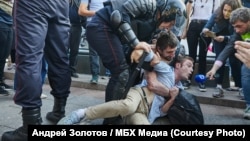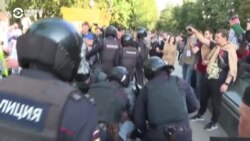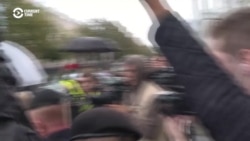Tatyana Telminova, a member of the ruling United Russia party, came face to face Saturday with a reality that has confronted many others over the past month in Moscow’s unsanctioned election protests: Russian riot police tend to detain first and may or may not ask questions later.
On August 3, five police officers overpowered and hustled off Telminova’s husband after he yelled at a line of riot police on the city’s Trubnaya Square to learn why they would not let people cross the street.
“[I]n general, it’s forbidden to detain people without a reason!” Telminova fumed to Current Time after her flag-emblazoned party card failed to secure her husband’s release. She was last seen calling the prosecutor’s office.
A few thousand people, including journalists and juveniles, have been detained by police since July 14, when voters first took to the streets to demand the registration of opposition and independent candidates in September’s city-council elections.
The law-enforcement monitor OVD-Info estimates that police detained 1,001 people during the unsanctioned rally on August 3. The Moscow city police state that around 600 people were detained out of 1,500 participants.
But with few physical signs of a protest, it was not always immediately clear who – or where -- these demonstrators were. Participants had described the rally as a “stroll” at points along Moscow’s ring road, a major transportation thoroughfare that encircles the city center.
Some of those who were dragged off to police vans – mostly young men – told Current Time they had no idea why they had been detained.
Prominent anti-torture activist Igor Kalyapin, a member of the Presidential Human Rights Council, found himself among their number.
“I can only guess what the reason was,” he said of his detention, speaking to Current Time from a police van via his smart phone. He recounted that police had detained him “literally two minutes” after his “short interview” with Dozhd, an independent TV station that was raided by police during its live broadcast of the July 27 election protest.
Aleksandr Svidersky, a member of a Moscow precinct election commission, told OVD-Info that he was walking through Trubnaya Square with an umbrella and his dog when five law-enforcement officers ran up to him. He said that he managed to hand the dog to an acquaintance before he himself was pushed into a police van and eventually severely beaten.
Police do not appear to have responded publicly to the allegation.
As international coverage and condemnation of such detentions continue, the Russian government has begun to hint at an international conspiracy behind the rallies.
On August 5, the Russian embassy to the United Kingdom alleged that British media reporting about the August 3 rally “compels consideration about their engagement and immediate interest in the shaking up of the domestic political situation in our country,” according to Russia’s TASS news agency.
A day earlier, Russian Foreign Ministry spokeswoman Maria Zakharova announced that an official notification would be filed with the U.S. and German governments about the supposed “interference of their diplomats and the state-run media in Russia’s politics.”
Citing a Russian-language map of the approximate protest route published by the U.S. embassy as part of a safety alert, Zakharova claimed that American diplomats had been “actively drawn into” the protests. In turn, she alleged that Germany’s Deutsche Welle broadcaster had summoned Russian-speaking audiences “to take to the streets.”
Deutsche Welle denied the charges and stated that it believed them “connected to the arrest of correspondent Sergey Dik” during the July 27 election protests.
But the campaign against supposed foreign "interference" is not just focused abroad. On August 4, national broadcaster NTV published an “appeal” from unidentified members of Russia’s law-enforcement bodies that charged that “organizers of the disorders in Moscow” are in foreign pay “to shake up the situation in Russia.”
The text appeared after charges were filed against 30-year-old Vladislav Sinits for allegedly threatening online “to deal with” the children of law-enforcement officers.
Andrei Glukhov, head of the Apologia Protesta legal-defense project, believes that the government is coordinating all its responses to the protests “to create an atmosphere of fear -- that if you go out, we’ll put you in prison.”
Nine people have been arrested to date on criminal charges of participating in a mass disorder. If convicted, they face up to eight years in prison.
Charges of money laundering a billion rubles ($15.3 million) have also been filed against the non-governmental Anti-Corruption Foundation, financed by opposition activist Aleksei Navalny, currently in jail for his role organizing the protests.
Speaking to Current Time from a police van, Georgy Alburov, head of the Foundation’s investigations department, dismissed the accusation as “very funny.”
Alburov was later placed in confinement for 10 days on administrative charges of disrupting public order.
Foundation lawyer and would-be city-council candidate Lyubov Sobol, a recurring target for detentions, was fined 300,000 rubles ($4,577) for allegedly violating regulations for public meetings and supposedly having dead and non-existent signatories in her candidate-registration papers, RIA-Novosti reported.
But Tanya Lokshina Europe and Central Asia associate director at Human Rights Watch, a U.S.-based monitor organization, questions whether such tactics can succeed in the long run in quelling the protests.
Plans already have been announced for another street protest in Moscow on August 10, in parallel with demonstrations in the regions.
“[J]udging by how people are gathering today, they are not scared,” commented Lokshina, speaking on August 3 at Moscow’s Trubnaya Square. “They want to stand up for their rights and want their voices to be heard.”
Editor's Note: Natalya Telminova's last name was originally incorrectly written as Terminova. It has been corrected.









Facebook Forum